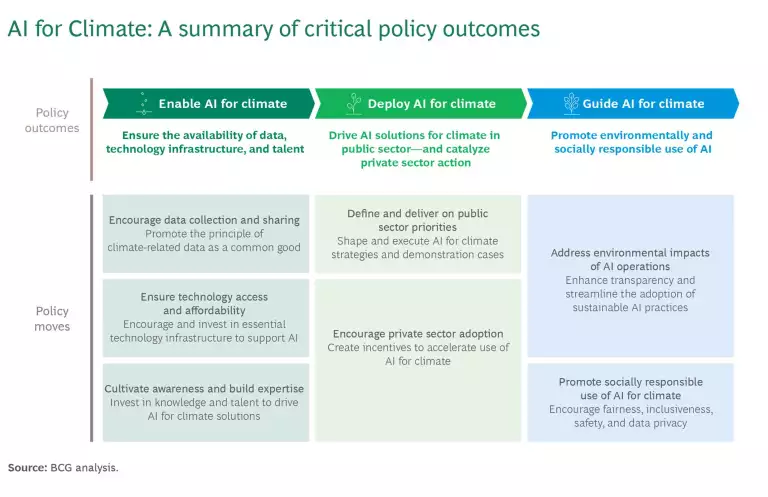With the world on a path to fail to meet the Paris Agreement’s goal to keep warming under 1.5° Celsius, there is an urgent need to accelerate climate action. To get back on track, a substantial reduction in emissions—to 57% of 2010’s level—is required by 2030. And leveraging AI for climate change has enormous promise given the technology’s strength in understanding and modeling complex systems.
Accelerating Climate Action with AI—a new BCG report commissioned by and co-authored with Google—finds that deploying today’s AI technology and scaling has already proven that AI applications for climate can significantly reduce global greenhouse gas (GHG) emissions. Moreover, it outlines how AI can also substantially enhance climate-related adaptation and resilience efforts and shape climate-friendly behaviors. It also discusses AI’s potential to contribute to groundbreaking scientific discoveries—for example, in nuclear fusion—that open new avenues for climate action.
The report also spotlights early success stories, explores AI-related risks and options to address them, and summarizes opportunities for policymakers and business leaders to maximize the benefits and minimize the risks of AI for
climate change.
Six Takeaways on AI for Climate Change
1. By scaling currently proven applications and technology, AI has the potential to unlock insights that could help mitigate 5% to 10% of GHG emissions by 2030—and to significantly bolster climate-related adaptation and resilience initiatives.
2. Beyond helping to reduce emissions and enhance the resilience of communities and infrastructure, AI can accelerate climate action by taking climate modeling to the next level, enabling new approaches to climate education, and supporting breakthroughs in climate science, climate economics, and fundamental research.
3. AI’s strengths in curating information, enhancing prediction, and guiding optimization can speed progress in three crucial areas:
- Mitigating emissions
- Supporting adaptation and resilience to unavoidable climate impacts
- Enhancing the state of the art in climate modeling, climate economics, climate education, and climate-related basic research
4. While AI is only just starting to be applied to climate challenges, leading-edge organizations and use cases are already achieving real results—and demonstrating the potential of AI for climate change if adopted at scale. And 87% of executives believe AI has potential to address their climate challenges .
5. AI, of course, also poses risks—data center emissions, water use for data center cooling, and electronic waste as well as broader concerns about equity and privacy—that must be managed thoughtfully. And organizations have options and are already taking steps to mitigate risks.
6. Policymakers have three critical oversight roles to play in maximizing the benefits and minimizing the risks of AI for climate. The report details three critical policy outcomes, offering a potential list of supporting policy moves and policy examples (see the exhibit below) for each:

- Enabling AI for climate progress by encouraging data sharing, ensuring affordable technology access, building awareness, and investing in talent
- Accelerating the deployment of AI for climate by defining public and private sector priorities, delivering on public sector use cases, and encouraging private sector action
- Promoting environmentally and socially responsible deployment of AI




